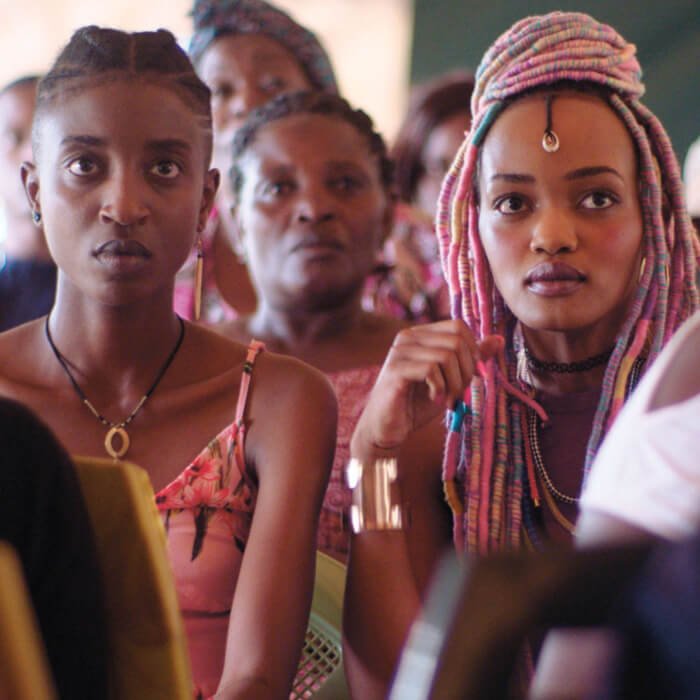Rafiki: TIFF 2018 Review
Kenyan Director Wanuri Kahiu‘s new feature, Rafiki, was the first movie that we screened at this year’s Toronto International Film Festival. It is a love story between two females set in an African nation that is still eons behind most of the world when it comes to relations of the heart that are not heterosexual.
It plays out, in the beginning, as a genuine puppy love, school girl crush, between our two protagonists, Kena and Ziki, played truthfully and with touching sensitivity by two first-time actresses, Samantha Mugatsia and Sheila Munyiva. The general attraction naturally progresses into a friendship rife with secret flirtations until a line is ultimately crossed. In Kenya, not only is it not socially acceptable to be gay, but it is also a designation that puts many homosexual’s lives in danger. Essentially, they must still live in secret, …or risk everything.
Review
In this vein, on this western continent, Rafiki is a story that we’ve seen before many times; whether in Philadelphia (1993) with Tom Hanks, or Milk (2008) with Sean Penn, or Barry Jenkins’ Moonlight (2016) or any other number of countless stories of conflict and oppression that the LGBTQ community has had to face. All poignant, all real.
Rafiki, which means “friend”, is the first commercial film of it’s kind that has been produced in Kenya. So much so that as principal photography started on the first shot, none of the crew were aware of the film’s subject matter. This was by design. Only the main actors, the writers, and director knew the plot. As Wanuri tells it, once it became evident that the film was going to be about these two young women falling in love with each other, many of the crew had a crisis of conscience on whether or not they would continue to take money to work on such a film — possibly due to their own feelings on the topic, or because of fear of government, or societal retribution for taking part in such a production.
The film got made, but was banned in Kenya, not for it’s lesbian scenes or subject matter, but for being “too hopeful”. The protagonists were not punished enough. Although homosexuality is not technically illegal in Kenya, homosexual intercourse is considered a felony in the country and those found guilty of the act can face up to 14 years in prison. Therein lies the Kenyan government’s biggest problem with Rafiki. On Septemeber 10, after the TIFF screening, Wanuri Kahiu and other contemporaries filed a law suit against the Kenyan film classification system and the Attorney General stating that the nationwide ban is a ban on free speech which is against the country’s constitution.
It is an enjoyable film. Both actresses come forth with stellar debut performances. Kena’s relationship with her father was surprisingly tender, as the mother was depicted as the true antagonist to her daughter’s lifestyle. I wish more time was spent on the connection between the two leads. Without that bridge being built, one wondered if this was love or just infatuation or, more trivially, two headstrong, young, experimenting girls that wanted to rebel against oppressive societal norms. Maybe it doesn’t matter. However, when you think about what they were risking — social exile, physical harm or death — you want their connection to mean more. Romeo & Juliet, this is not.
The supporting cast didn’t really factor into the equation properly either. Kena is the more masculine of the two (she skateboards and dresses like a boy and has masculine mannerisms), yet she has a big, buff friend named Blacksta, who eventually wants her to be his woman. Meanwhile, the uber feminine figure that is Ziki, with softer features, mannerisms and dress, is secretly coveted by another female in her crew that she may or may not have had a relationship with in the past, or perhaps she is just jealous of the fact that all of her time is being spent with Kena. None of these side factors are fully developed and, therefore, are left for the audience to make the leaps or interpretations regarding them.
Unfortunately, this is also the case for the ending. The anti-climactic climax. Coincidentally, this is the same problem that many people also had with Moonlight‘s third act. As courageous as both of these films are, they both, for this reviewer, ended flat. Leaving you with more questions than resolutions. Without giving too much away, I will say that the third act of Rafiki, although more entertaining, is rather anti-cathartic.
I do, however, understand the dilemma of these directors and writers, though. In avoiding fairytale endings (or any ending at all), they are avoiding the trivialization and exploitation of the same-sex relationship and plight. However, I would argue that as the discourse is still active, and men and women are still being persecuted for it, showing the strength and determination of such a love is just as important as appeasing those who are against it or not understanding it. Defiantly, it is the LOVE, the beginning, middle, as well as the beautiful ending (whether common or rarely achieved) that should be shown to us. The movie screen, is not only a reflection of who we are as a society, but also as what we can become, and it should be used that way to fight the biggest social wars that infect our world today.






